“A Thin Place”
Psalm 29: 1-4, 10-11 and Matthew 3:13-17
January 12, 2020, Boeuff Presbyterian Church
Growing up in Northwest Ohio, there wasn’t much of a horizon. When you tried to look for where the sky touched the earth it was mostly just buildings or trees in the way. But I’ve been some places where the sky and the earth meet in some pretty spectacular ways. Once, I was part of a crew filming a kid’s program in Alaska and watched the sunrise over a bay as dolphins leaped and eagles soared.
For our honeymoon, David and I went to the Grand Canyon and were delighted to watch the sunset over the canyon. And the sunsets I’ve experienced on my drives in for our Lenten worship services have been quite incredible in their own right. It is these meetings of the sun and the earth that come to mind when I imagine our text today, “suddenly the heavens were opened to him.”
One of the words I have heard used to describe God’s incarnation in Christ is “condescension.” Since this primarily carries a negative connotation I initially balked at that word being used, but then I just couldn’t get it out of my head. And one of the ways the Holy Spirit shows up in my life is in those little earworms of phrases that echo through my consciousness as I seek to connect with scripture. In Christ, God is condescending to us. The divine descends to dwell in the ordinariness of human skin. The heavens touch the earth in the person of Christ..
There is a term used in Celtic spirituality and throughout the history of Irish tradition called a “thin place.” It describes “a place in time where the space between heaven and earth grows thin and the Sacred and the secular seem to meet.”
There are places around the world that are distinctly referred to as thin places, where many others have identified feeling God’s presence. There’s even a travel company called “Thin Places Mystical Tours,” that will take you to various locations in Ireland and Scotland. Iona in Scotland is one such place, and certainly the wailing wall in Jerusalem and the mosque in Mecca. I’ve heard people refer to their beloved childhood summer camp in this way. Maybe for you it’s been a family vacation spot or beloved treehouse growing up where you did all your best thinking.
Thin places can be used to describe both a physical space and a particular date and time. In Greek, the word “kairos” is used for this sort of time, God’s time, the fullness of time, that often has little to do with clocks or calendars.
If ever there were a thin place, Jesus’ birth and baptism stand out as prime examples. In the liturgical calendar we’ve just left the thin place that is the nativity with a newborn Jesus of Nazareth swaddled, being kept warm by a host of earthly animals and attended by a host of heavenly angels. Divinity made incarnate in humanity.
This week our text takes us to the waters of the Jordan, and that baby has grown into a man. In the waters of baptism, Christ condescends to John, insisting that it is right that John be the one to baptize Jesus. Humanity extends it’s blessing in John, while the Holy Spirit descends upon him like a dove and “alights” on him.
When I hear the part about “ the Spirit of God… alighting on [Jesus]” I think of a line in It’s a Wonderful Life, when George Bailey is telling Mary that he’ll lasso the moon for her and that she “can swallow it… and the moonbeams would shoot out of [her] fingers and your toes and the ends of [her] hair.” I wonder if this is how Jesus looked, light radiating out in beams.
To me, Jesus’ baptism scene strikes me as an invitation, not to any place or time in particular, but an invitation to seek out divine incarnation. To look for the places that God “alights.” To see if that thinness the Celts speak about is closer than you may have previously thought possible.
New York Times Travel Journalist, Eric Weiner wrote about his search for “thin places” in a piece entitled, “Where Heaven and Earth Come Closer.” He frames his search saying, “The question, of course, is which places? And how do we get there? You don’t plan a trip to a thin place; you stumble upon one. But there are steps you can take to increase the odds of an encounter with thinness. For starters, have no expectations. Nothing gets in the way of a genuine experience more than expectations, which explains why so many ‘spiritual journeys’ disappoint. And don’t count on guidebooks — or even friends — to pinpoint your thin places. To some extent, thinness, like beauty, is in the eye of the beholder. Or, to put it another way: One person’s thin place is another’s thick one.”
Episcopal Pastor and Christian Educator, Debie Thomas writes of how difficult it can be to find that thin-ness, even and especially where others have said they have experienced God in space, but also in action through the sacraments of baptism and communion..
She writes, “How much nicer it would be if the font were self-evidently holy. But no — the font is just tap water, river water, chlorine. The thin place is a neighborhood, a forest, a hilltop. The voice that might be God might also be wind, thunder, indigestion, or delusion. Is the baby divine? Or have we misread the star? Is this the body and blood of God’s Son? Or is it a mere hunk of bread? A jug of wine?
What I mean to say is that there is no magic — we practice Epiphany. The challenge is always before us. Look again. Look harder. See freshly. Stand in the place that might possibly be thin, and regardless of how jaded you feel, cling to the possibility of surprise. Epiphany is deep water — you can’t stand on the shore and dip your toes in. You must take a breath and plunge.”
On this day of celebration Jesus’s baptism, may we ever be on the lookout for how heaven is meeting the earth. Even with us, even right here, even right now. Thanks be to God. Amen.




 What is your earliest memory of church?
What is your earliest memory of church?  My family started going to First Presbyterian Church of Maumee when I was five and my earliest memory there comes from our very first Sunday attending when I went to Sunday School. I remember walking up to my now best friend, Claire, and asking her if she would be my friend. Twenty-five years of friendship later, I’m still glad she said yes. It was in that Sunday school room and throughout that church that I really started to figure out who this God was that everybody was talking about. In that church, I felt God’s own call for my life and was nurtured by so many Sunday School teachers, Vacation Bible School leaders, youth group leaders, and pastors.
My family started going to First Presbyterian Church of Maumee when I was five and my earliest memory there comes from our very first Sunday attending when I went to Sunday School. I remember walking up to my now best friend, Claire, and asking her if she would be my friend. Twenty-five years of friendship later, I’m still glad she said yes. It was in that Sunday school room and throughout that church that I really started to figure out who this God was that everybody was talking about. In that church, I felt God’s own call for my life and was nurtured by so many Sunday School teachers, Vacation Bible School leaders, youth group leaders, and pastors. Who are some of the people who have helped you to form your faith? Who are the gum providers who’ve sat beside you and helped you find your place in the hymnal? Who are those who, seeing your need for extra assistance, in any season of life, have come alongside you, helping open a door when you approach with your walker, or providing a worship bag as you’ve been a frazzled parent.
Who are some of the people who have helped you to form your faith? Who are the gum providers who’ve sat beside you and helped you find your place in the hymnal? Who are those who, seeing your need for extra assistance, in any season of life, have come alongside you, helping open a door when you approach with your walker, or providing a worship bag as you’ve been a frazzled parent.  When I was in seminary my very own Grandma away from home was named Lena Love. Lena and I met my first Sunday at that church when, seeing her sitting by herself, I came and sat beside her. We talked every week after service and eventually would go out to lunch from time to time. She was a great listener and I felt like I could truly be myself around her, telling her about stresses and struggles, heartaches and hopes for the future. In my last few months of seminary, at the age of 93, she became ill, her health declined rapidly, and she died just a few days before my graduation. In our short time together she taught me the importance of investing in the lives of others and making family where you find it.
When I was in seminary my very own Grandma away from home was named Lena Love. Lena and I met my first Sunday at that church when, seeing her sitting by herself, I came and sat beside her. We talked every week after service and eventually would go out to lunch from time to time. She was a great listener and I felt like I could truly be myself around her, telling her about stresses and struggles, heartaches and hopes for the future. In my last few months of seminary, at the age of 93, she became ill, her health declined rapidly, and she died just a few days before my graduation. In our short time together she taught me the importance of investing in the lives of others and making family where you find it.  In our scripture today we hear about children coming to Jesus to receive his prayers. In the familiar scene of many children’s Bibles, disciples try to hold the children back, but Jesus insists that come forward.
In our scripture today we hear about children coming to Jesus to receive his prayers. In the familiar scene of many children’s Bibles, disciples try to hold the children back, but Jesus insists that come forward. “The little children
“The little children  How do you see yourself in this Biblical narrative? Certainly, we’d all like to see ourselves as those acting as an encouragement. I feel like often the Gospel writers cast the disciples somewhat of dunces. In this passage it seems like Jesus is saying, silly disciples, sermons are for kids!
How do you see yourself in this Biblical narrative? Certainly, we’d all like to see ourselves as those acting as an encouragement. I feel like often the Gospel writers cast the disciples somewhat of dunces. In this passage it seems like Jesus is saying, silly disciples, sermons are for kids! But if we’re honest with ourselves, it’s not always easy to be the ones inviting in energetic children or welcoming every guest. I get it, it’s been a long week, you’re dealing with a lot. Can’t you just have one hour a week to take some time alone with God? The thing is, corporate worship is just that, corporate. It is the time when we come together, the separate parts of the body of Christ making the whole. If it were easy, I really don’t think Jesus would’ve had to mention it so often.
But if we’re honest with ourselves, it’s not always easy to be the ones inviting in energetic children or welcoming every guest. I get it, it’s been a long week, you’re dealing with a lot. Can’t you just have one hour a week to take some time alone with God? The thing is, corporate worship is just that, corporate. It is the time when we come together, the separate parts of the body of Christ making the whole. If it were easy, I really don’t think Jesus would’ve had to mention it so often.  And one of the incredible things about corporate worship, is that each one of us gathered, is created in the image of God, so when we are all together we are better able to understand the full nature of God. And when I say
And one of the incredible things about corporate worship, is that each one of us gathered, is created in the image of God, so when we are all together we are better able to understand the full nature of God. And when I say  I’ve often heard those familiar Whitney Houston lyrics, “children are the future.” This is said in the sure and certain knowledge that when we are gone, today’s children will be tomorrow’s elders, deacons, and pastors. They will be the ones shaping what decisions the church makes in who and how it will serve.
I’ve often heard those familiar Whitney Houston lyrics, “children are the future.” This is said in the sure and certain knowledge that when we are gone, today’s children will be tomorrow’s elders, deacons, and pastors. They will be the ones shaping what decisions the church makes in who and how it will serve.  But,
But,  Christian Education Director and blogger, Christina Embree, wrote an excellent post about children in worship, saying that worshipping with children not just about keeping kids occupied so as not to distract from the worship the adults are doing, but it’s about Jesus’ repeated call to value the contributions of kids in worship.
Christian Education Director and blogger, Christina Embree, wrote an excellent post about children in worship, saying that worshipping with children not just about keeping kids occupied so as not to distract from the worship the adults are doing, but it’s about Jesus’ repeated call to value the contributions of kids in worship. As a congregation, it is vital that we support all who come to into this space looking to grow in faith, from the very youngest to our most established members. I know many in this church have been members for over 50 years. To say that is incredible is an understatement. Someone doesn’t stay a member for 50 years because they think it’s a pretty building or because they’ve always gotten what they wanted. If you’ve been here for 50 years, chances are you are here because this is the place that you’ve experienced God at work, maybe in the friendship of those you’ve come to know through a mission trip, Circle, or work on a committee; perhaps through the care of Deacons as a new parent or after the death of someone you loved. You know the body of Christ because you’ve seen it in action through this congregation and you’ve had opportunities to act as this body too.
As a congregation, it is vital that we support all who come to into this space looking to grow in faith, from the very youngest to our most established members. I know many in this church have been members for over 50 years. To say that is incredible is an understatement. Someone doesn’t stay a member for 50 years because they think it’s a pretty building or because they’ve always gotten what they wanted. If you’ve been here for 50 years, chances are you are here because this is the place that you’ve experienced God at work, maybe in the friendship of those you’ve come to know through a mission trip, Circle, or work on a committee; perhaps through the care of Deacons as a new parent or after the death of someone you loved. You know the body of Christ because you’ve seen it in action through this congregation and you’ve had opportunities to act as this body too. I’m not sure I can put into words how important I think it is that we’re all in worship together with one another. We call this body of believers our church family and at baptism, we promise to support one another as we each grow in faith. In order to do that, we need to know one another. We need to be attentive to times when someone is in need of a pew buddy, a helping hand, or just a whole lot of grace.
I’m not sure I can put into words how important I think it is that we’re all in worship together with one another. We call this body of believers our church family and at baptism, we promise to support one another as we each grow in faith. In order to do that, we need to know one another. We need to be attentive to times when someone is in need of a pew buddy, a helping hand, or just a whole lot of grace. Many people, even those who are lifelong Christians, are surprised to hear that the trinity is not in scripture. We have it in our creeds, our confessions, our catechisms, look out in the Narthex and you’ll see it represented on the stained glass depictions on the confessional banners, but at no point do Jesus, Paul, or any other apostles stop amidst their theological teachings and lay out the spiritual math equation of 1 Creator + 1 Savior Jesus + 1 Holy Spirit = 1 God. Christian teaching is one of very few places you will be taught that 3 = 1.
Many people, even those who are lifelong Christians, are surprised to hear that the trinity is not in scripture. We have it in our creeds, our confessions, our catechisms, look out in the Narthex and you’ll see it represented on the stained glass depictions on the confessional banners, but at no point do Jesus, Paul, or any other apostles stop amidst their theological teachings and lay out the spiritual math equation of 1 Creator + 1 Savior Jesus + 1 Holy Spirit = 1 God. Christian teaching is one of very few places you will be taught that 3 = 1. I know I’ve struggled with this understanding, especially in the Old Testament when there is so much language simply referring to God as “Lord.” For much of the Bible you only have one aspect referred to at any given time. It’s always struck me like one of those movie tropes where you only realize people are twins once you get them in the same room. But here, in this story we have the big three all together in one place: Parent, Child, Spirit; Father Son, Holy Ghost; or my favorite, Creator, Redeemer, Sustainer.
I know I’ve struggled with this understanding, especially in the Old Testament when there is so much language simply referring to God as “Lord.” For much of the Bible you only have one aspect referred to at any given time. It’s always struck me like one of those movie tropes where you only realize people are twins once you get them in the same room. But here, in this story we have the big three all together in one place: Parent, Child, Spirit; Father Son, Holy Ghost; or my favorite, Creator, Redeemer, Sustainer. 
 If you’re as intrigued by the symbols of the Bible as I am, “Consider the Birds,” by Debbie Blue is a really interesting read. The book highlights the role various birds play in the Biblical narratives as well as other layers of historical secular meanings. One of the ways that the dove as Holy Spirit is described is as the creative catalyst, the initiator. Blue writes, “In the beginning of the Gospel of Luke, the spirit of God hovers over Mary. The Spirit hovered over the deep in Genesis and made it pregnant so that the deep birthed creation; now it hovers over Mary and makes her pregnant. Christian art throughout the centuries has depicted this hovering presence…as a dove… Once we get to the baptism of Jesus the text is explicit. Here the spirit of God shows up, and this time each of the Gospel writers is clear: LIKE A DOVE. The heavens open and the spirit of God comes down, alighting on Jesus’ shoulder and a voice from heaven says, ‘This is my Son… with whom I am well pleased.’ “
If you’re as intrigued by the symbols of the Bible as I am, “Consider the Birds,” by Debbie Blue is a really interesting read. The book highlights the role various birds play in the Biblical narratives as well as other layers of historical secular meanings. One of the ways that the dove as Holy Spirit is described is as the creative catalyst, the initiator. Blue writes, “In the beginning of the Gospel of Luke, the spirit of God hovers over Mary. The Spirit hovered over the deep in Genesis and made it pregnant so that the deep birthed creation; now it hovers over Mary and makes her pregnant. Christian art throughout the centuries has depicted this hovering presence…as a dove… Once we get to the baptism of Jesus the text is explicit. Here the spirit of God shows up, and this time each of the Gospel writers is clear: LIKE A DOVE. The heavens open and the spirit of God comes down, alighting on Jesus’ shoulder and a voice from heaven says, ‘This is my Son… with whom I am well pleased.’ “
 Now I have a bit of a linguistic confession to make. Without being hyperbolic, I think I can honestly say I’ve read this passage at least 100 times. And every time previous to
Now I have a bit of a linguistic confession to make. Without being hyperbolic, I think I can honestly say I’ve read this passage at least 100 times. And every time previous to  Turns out, when you dig around a bit in other translations and in the Greek, the real definition of “alighting” here is, “to descend and settle.” This evokes images of a crisp tree in autumn falling on green grass, a butterfly on a flower, or a pigeon on a park statue. Not quite as intense as I thought.
Turns out, when you dig around a bit in other translations and in the Greek, the real definition of “alighting” here is, “to descend and settle.” This evokes images of a crisp tree in autumn falling on green grass, a butterfly on a flower, or a pigeon on a park statue. Not quite as intense as I thought. And where does he go from here? Does he have an internship at the office of a minor deity or perhaps an apprenticeship so he can learn the family trade of divinity? No, there’s no easy resting for him, once these words come to him he goes out into the wilderness,
And where does he go from here? Does he have an internship at the office of a minor deity or perhaps an apprenticeship so he can learn the family trade of divinity? No, there’s no easy resting for him, once these words come to him he goes out into the wilderness, 
 Debbie Blue writes of the symbolic significance: “Jesus starts out his ministry by being baptized. Baptism is a symbol of death and renewed life. It’s a bold statement to begin with. God’s don’t generally die. – nor would they stoop to be baptized in the river with the masses of the ordinary. To be alive involves a lot: suffering and taste buds and sweetness and muck. The spirit of God is not apart from this. It hovered over the deep and called out life. “
Debbie Blue writes of the symbolic significance: “Jesus starts out his ministry by being baptized. Baptism is a symbol of death and renewed life. It’s a bold statement to begin with. God’s don’t generally die. – nor would they stoop to be baptized in the river with the masses of the ordinary. To be alive involves a lot: suffering and taste buds and sweetness and muck. The spirit of God is not apart from this. It hovered over the deep and called out life. “ I’ve always loved baptisms: the words of promise, the words of covenant, the words of welcoming. It is always an honor and a privilege to perform a baptism. Every one of them is different: I’ve seen wonder and innocence in the eyes of small babies, a range of joy and vulnerability among adults and youth. There were some babies who were calm and happy in the waters, others who squirmed and cried. Each time I’ve made the trip down the aisle with the newly baptised, telling each of them how all of this congregation had just promised to watch out for them. How we as a big Christian family promise at each baptism to nurture each other in the family of faith.
I’ve always loved baptisms: the words of promise, the words of covenant, the words of welcoming. It is always an honor and a privilege to perform a baptism. Every one of them is different: I’ve seen wonder and innocence in the eyes of small babies, a range of joy and vulnerability among adults and youth. There were some babies who were calm and happy in the waters, others who squirmed and cried. Each time I’ve made the trip down the aisle with the newly baptised, telling each of them how all of this congregation had just promised to watch out for them. How we as a big Christian family promise at each baptism to nurture each other in the family of faith. We say the words “remember your baptism,” and for many, myself and many of these babies included, we are not able to remember the exact moment we were baptized. I can’t tell you whether the water was warm or cold. I can’t tell you if it had been rainy day or how many family members showed up. But, I can tell you about seeing the baptisms of many others over the years, and hearing pastors say, “remember your baptism.”
We say the words “remember your baptism,” and for many, myself and many of these babies included, we are not able to remember the exact moment we were baptized. I can’t tell you whether the water was warm or cold. I can’t tell you if it had been rainy day or how many family members showed up. But, I can tell you about seeing the baptisms of many others over the years, and hearing pastors say, “remember your baptism.” “Remember your baptism.” The echo of those words across the years are more than just trying to recall the specific event of the sacrament of your baptism. They are truly about remembering the covenant of baptism. Remembering the promises of your community to support you as you grow into faith in Jesus Christ. Remembering how you too have promised to support others as they seek to know and follow Christ. Remembering how you are part of a Christian family so much larger than all the Christians you could possibly meet in your lifetime. You are brothers and sisters in Christ, siblings in God’s family.
“Remember your baptism.” The echo of those words across the years are more than just trying to recall the specific event of the sacrament of your baptism. They are truly about remembering the covenant of baptism. Remembering the promises of your community to support you as you grow into faith in Jesus Christ. Remembering how you too have promised to support others as they seek to know and follow Christ. Remembering how you are part of a Christian family so much larger than all the Christians you could possibly meet in your lifetime. You are brothers and sisters in Christ, siblings in God’s family.
 The Directory for Worship of the PCUSA affirms that our sacraments, including baptism, “are signs of the real presence and power of Christ in the Church, symbols of God’s action.” It also says that “The body of Christ is one, and Baptism is the bond of unity in Christ. As they are united with Christ through faith, Baptism unites the people of God with each other and with the church of every time and place. Barriers of race, gender, status, and age are to be transcended. Barriers of nationality, history, and practice are to be overcome.” And we affirm that, “through the Sacraments, God seals believers in redemption, renews their identity as the people of God, and marks them for service.”
The Directory for Worship of the PCUSA affirms that our sacraments, including baptism, “are signs of the real presence and power of Christ in the Church, symbols of God’s action.” It also says that “The body of Christ is one, and Baptism is the bond of unity in Christ. As they are united with Christ through faith, Baptism unites the people of God with each other and with the church of every time and place. Barriers of race, gender, status, and age are to be transcended. Barriers of nationality, history, and practice are to be overcome.” And we affirm that, “through the Sacraments, God seals believers in redemption, renews their identity as the people of God, and marks them for service.” What an incredible claim that is! We are sealed in redemption, renewed as people of God, and marked for service. We are called to be united in that baptism, in equality throughout time and beyond all earthly demographic divisions. We remember our baptism by living into God’s call on our lives, individually and as the body of Christ.
What an incredible claim that is! We are sealed in redemption, renewed as people of God, and marked for service. We are called to be united in that baptism, in equality throughout time and beyond all earthly demographic divisions. We remember our baptism by living into God’s call on our lives, individually and as the body of Christ. The Directory for worship says, “In Baptism, the Holy Spirit binds the Church in covenant to its Creator and Lord. The water of Baptism symbolizes the waters of Creation, of the Flood, and of the Exodus from Egypt. Thus, the water of Baptism links us to the goodness of God’s creation and to the grace of God’s covenants with Noah and Israel. Prophets of Israel, amidst the failure of their own generation to honor God’s covenant, called for justice to roll down like waters and righteousness like an everflowing stream. (Amos 5:24) They envisioned a fresh expression of God’s grace and of creation’s goodness, a new covenant accompanied by the sprinkling of cleansing water. In his ministry, Jesus offered the gift of living water. So, Baptism is the sign and seal of God’s grace and covenant in Christ.”
The Directory for worship says, “In Baptism, the Holy Spirit binds the Church in covenant to its Creator and Lord. The water of Baptism symbolizes the waters of Creation, of the Flood, and of the Exodus from Egypt. Thus, the water of Baptism links us to the goodness of God’s creation and to the grace of God’s covenants with Noah and Israel. Prophets of Israel, amidst the failure of their own generation to honor God’s covenant, called for justice to roll down like waters and righteousness like an everflowing stream. (Amos 5:24) They envisioned a fresh expression of God’s grace and of creation’s goodness, a new covenant accompanied by the sprinkling of cleansing water. In his ministry, Jesus offered the gift of living water. So, Baptism is the sign and seal of God’s grace and covenant in Christ.” Through our baptism every one of God’s children enveloped in the promises of God, each one of us named and accounted for, sharing in God’s blessing at Jesus’ baptism, that each of us is beloved, and in each of us God is well pleased. Thanks be to God. Amen.
Through our baptism every one of God’s children enveloped in the promises of God, each one of us named and accounted for, sharing in God’s blessing at Jesus’ baptism, that each of us is beloved, and in each of us God is well pleased. Thanks be to God. Amen. John the Baptist was a great many things, but subtle was not one of them. From the very first account of John in action we hear of him moving about in his mother’s womb to alert her to the presence of Jesus growing within Mary. And this action is echoed throughout the rest of his life as he is always making a ruckus demanding that people pay attention to the presence of Jesus.
John the Baptist was a great many things, but subtle was not one of them. From the very first account of John in action we hear of him moving about in his mother’s womb to alert her to the presence of Jesus growing within Mary. And this action is echoed throughout the rest of his life as he is always making a ruckus demanding that people pay attention to the presence of Jesus. In our text today we hear him confront those who have just been baptized in a very unsubtle way. Keep in mind these are the ones already seeking Christ, who have sought out John specifically so they may be baptized into this new way of being. But John doesn’t want them to use their baptism or God’s grace as an excuse to become complacent. Now that they have this new life they are to bear fruit, they are to thoughtfully and passionately follow the life that God has set before them.
In our text today we hear him confront those who have just been baptized in a very unsubtle way. Keep in mind these are the ones already seeking Christ, who have sought out John specifically so they may be baptized into this new way of being. But John doesn’t want them to use their baptism or God’s grace as an excuse to become complacent. Now that they have this new life they are to bear fruit, they are to thoughtfully and passionately follow the life that God has set before them. “What should we do, what should we do, what should we do?” The crowds ask this three times in our passage. It is important to think about why they asked this question.
“What should we do, what should we do, what should we do?” The crowds ask this three times in our passage. It is important to think about why they asked this question. They were interested in how to live faithfully, how to bear fruit as followers of God. They were probably afraid of the wrath of God, but they seemed equally afraid of separation from this new community of believers that was just beginning to form around the ministry of John the Baptist, and soon, Jesus of Nazareth, the messiah. John tells them that they are not secure in their faith by their religious lineage, their affiliation with Abraham, but rather only by their own individual repentance and seeking to be in right standing with God. This is a faith that required, well, faith.
They were interested in how to live faithfully, how to bear fruit as followers of God. They were probably afraid of the wrath of God, but they seemed equally afraid of separation from this new community of believers that was just beginning to form around the ministry of John the Baptist, and soon, Jesus of Nazareth, the messiah. John tells them that they are not secure in their faith by their religious lineage, their affiliation with Abraham, but rather only by their own individual repentance and seeking to be in right standing with God. This is a faith that required, well, faith. Discernment is one of those words that we tend to use in pivotal moments in our lives. Figuring out where to go to college, what career path to take, who to marry, all of these decisions are best made with serious discernment. Which means taking the time to figure out what is best, not just financially or logistically, but spiritually. What will bring you deepest joy? How can you best glorify God?
Discernment is one of those words that we tend to use in pivotal moments in our lives. Figuring out where to go to college, what career path to take, who to marry, all of these decisions are best made with serious discernment. Which means taking the time to figure out what is best, not just financially or logistically, but spiritually. What will bring you deepest joy? How can you best glorify God? The youth of this church are used to doing “highlights and lowlights,” as a way to reflect on their lives, where they experience joy, and where they experience sadness. In spiritual discipline terms this practice is called “examen.” Another way to look at this is what is life giving and what is depleting? Or what makes you feel closest to God and what makes you feel far away?
The youth of this church are used to doing “highlights and lowlights,” as a way to reflect on their lives, where they experience joy, and where they experience sadness. In spiritual discipline terms this practice is called “examen.” Another way to look at this is what is life giving and what is depleting? Or what makes you feel closest to God and what makes you feel far away? There is a book I’ve read about examen, talking about how to recognize God’s presence within and among our experiences, called “Sleeping with Bread.” The introduction explains the title saying, “During the bombing raids of World War II, thousands of children were orphaned and left to starve. The fortunate ones were rescued and placed in refugee camps where they received food and good care. But many of these children who had lost so much could not sleep at night. They feared waking up to find themselves once again homeless and without food. Nothing seemed to reassure them. Finally, someone hit upon the idea of giving each child a piece of bread to hold at bedtime. Holding their bread, these children could finally sleep in peace. All through the night the bread reminded them, ‘Today I ate and I will eat again tomorrow.’”
There is a book I’ve read about examen, talking about how to recognize God’s presence within and among our experiences, called “Sleeping with Bread.” The introduction explains the title saying, “During the bombing raids of World War II, thousands of children were orphaned and left to starve. The fortunate ones were rescued and placed in refugee camps where they received food and good care. But many of these children who had lost so much could not sleep at night. They feared waking up to find themselves once again homeless and without food. Nothing seemed to reassure them. Finally, someone hit upon the idea of giving each child a piece of bread to hold at bedtime. Holding their bread, these children could finally sleep in peace. All through the night the bread reminded them, ‘Today I ate and I will eat again tomorrow.’” In Luke 3, verses 10-14 we read: “And the crowds asked [John], ‘What then should we do?’ In reply he said to them, ‘Whoever has two coats must share with anyone who has none; and whoever has food must do likewise.’ Even tax collectors came to be baptized, and they asked him, ‘Teacher, what should we do?’ He said to them, ‘Collect no more than the amount prescribed for you.’ Soldiers also asked him, ‘And we, what should we do?’ He said to them, ‘Do not extort money from anyone by threats or false accusation, and be satisfied with your wages.’”
In Luke 3, verses 10-14 we read: “And the crowds asked [John], ‘What then should we do?’ In reply he said to them, ‘Whoever has two coats must share with anyone who has none; and whoever has food must do likewise.’ Even tax collectors came to be baptized, and they asked him, ‘Teacher, what should we do?’ He said to them, ‘Collect no more than the amount prescribed for you.’ Soldiers also asked him, ‘And we, what should we do?’ He said to them, ‘Do not extort money from anyone by threats or false accusation, and be satisfied with your wages.’” Through this, John offers specific actions to explain what it mean to bear “fruits worthy of repentance.” If you have more than you need, he says you must share. To the tax collectors who could profit from asking for a little or a lot extra in their collections, he tells them to take only what they are owed. And to the soldiers John tells them not to take advantage of their position of power.
Through this, John offers specific actions to explain what it mean to bear “fruits worthy of repentance.” If you have more than you need, he says you must share. To the tax collectors who could profit from asking for a little or a lot extra in their collections, he tells them to take only what they are owed. And to the soldiers John tells them not to take advantage of their position of power.
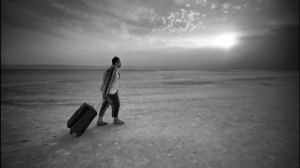




































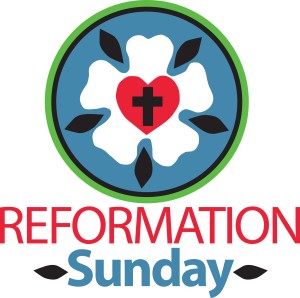
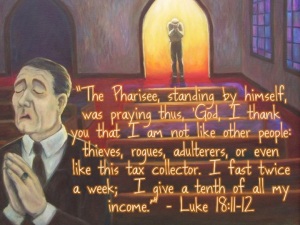
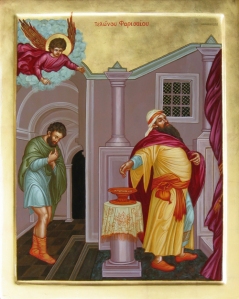

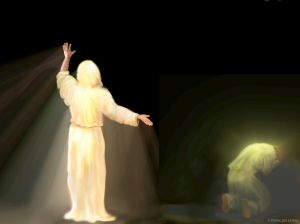






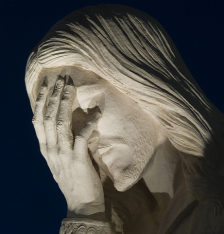








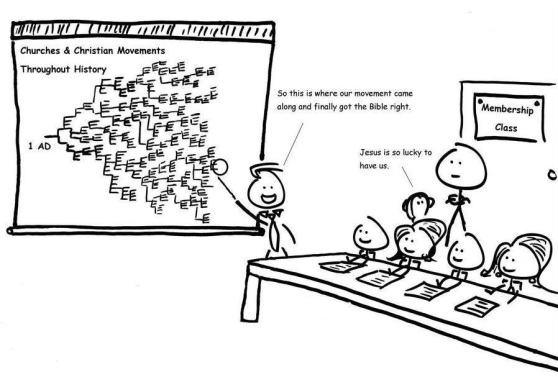















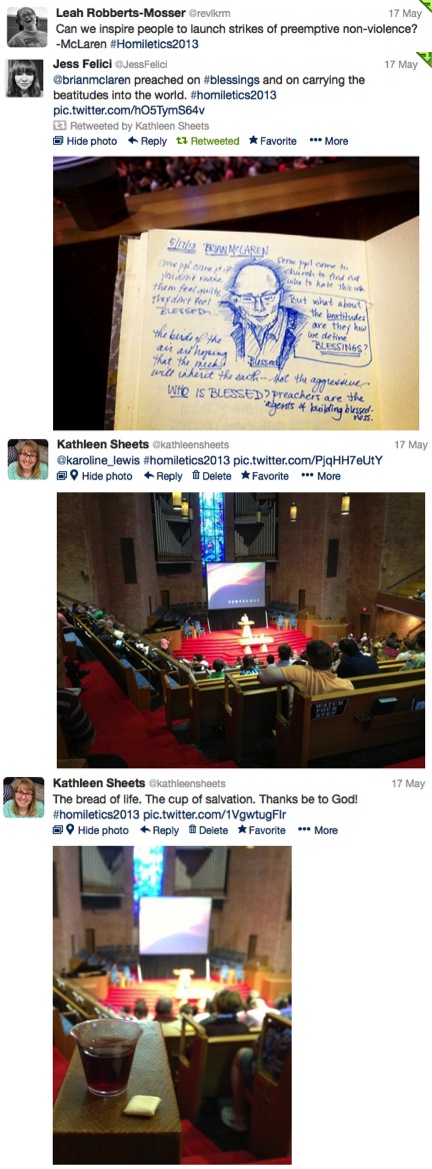
 Have you ever read the Bible and felt like this? Like you’re being pointed in all sorts of directions and you’re not sure where to go? Or maybe you felt that it might mean something for your life, but your not sure which? And when you read more about scripture it you might hear even more of a confusing message?
Have you ever read the Bible and felt like this? Like you’re being pointed in all sorts of directions and you’re not sure where to go? Or maybe you felt that it might mean something for your life, but your not sure which? And when you read more about scripture it you might hear even more of a confusing message?









































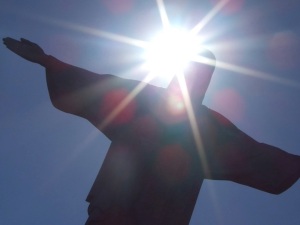

 ny guesses to who I might be talking about?
ny guesses to who I might be talking about? Angels announced both of their births. An angel came to Elizabeth, Mary’s cousin, and told her that even in her old age she would have a baby. An angel came to Mary and told her that even though she was a virgin she would have a baby. Surprises all around.
Angels announced both of their births. An angel came to Elizabeth, Mary’s cousin, and told her that even in her old age she would have a baby. An angel came to Mary and told her that even though she was a virgin she would have a baby. Surprises all around.
 John is often depicted like this picture here. Here in this otherwise formal portrait, John is disheveled, a wild man who lived out in the wilderness. He was described wearing a leather belt and a tunic of camel hair, living off locusts and wild honey. His message was not for those who were concerned with appearances, but for those concerned with God’s work throughout our lives and into eternity.
John is often depicted like this picture here. Here in this otherwise formal portrait, John is disheveled, a wild man who lived out in the wilderness. He was described wearing a leather belt and a tunic of camel hair, living off locusts and wild honey. His message was not for those who were concerned with appearances, but for those concerned with God’s work throughout our lives and into eternity. “What should we do?” asked the crowds.
“What should we do?” asked the crowds.
 John lived his life rejoicing in the company of Jesus Christ. As we are already in the midst of this season of giving, this is an important example to remember. In this Christmas season we will both give and receive gifts, but we needn’t get caught up so much in the gifts themselves, but rather on the relationships that surround them. When we give let us remember John’s command for sharing, fairness, and consideration, but also the simplicity and unconditional nature of John’s joy in God’s presence.
John lived his life rejoicing in the company of Jesus Christ. As we are already in the midst of this season of giving, this is an important example to remember. In this Christmas season we will both give and receive gifts, but we needn’t get caught up so much in the gifts themselves, but rather on the relationships that surround them. When we give let us remember John’s command for sharing, fairness, and consideration, but also the simplicity and unconditional nature of John’s joy in God’s presence. My sister and I were talking the other day about some gifts we have given and received over the years. No matter what the material gift was that was received, the ones that had the most impact were those that reflected a genuine, unsolicited knowledge of the recipient. These were gifts that required listening, required paying attention, required being in relationship. The greatest gift we can receive was the gift of being known.
My sister and I were talking the other day about some gifts we have given and received over the years. No matter what the material gift was that was received, the ones that had the most impact were those that reflected a genuine, unsolicited knowledge of the recipient. These were gifts that required listening, required paying attention, required being in relationship. The greatest gift we can receive was the gift of being known. With this in mind, the gifts of the wise men initially seem quite strange. They are coming to celebrate the birth of a baby and bring gold, frankincense, and myrrh. Seems like quite the strange baby shower presents. Surely these were not gifts that Mary and Joseph would’ve registered for at Babies R Us. But the gifts are also right on track because they point to a knowledge of who this little baby Jesus will become. These are gifts of knowing Jesus’ future. The gold was the symbol for the king; frankincense for the priesthood, and myrrh for healing. These gifts, then, point to a greater gift: the most important gift of this season that cannot be wrapped up in a box or written on a check.The most important gift is the gift of Jesus’ life, which is offered at his birth. Even as a baby, these gifts tell us that Christ is the great king, the priest of all priests, who came to heal this broken world.
With this in mind, the gifts of the wise men initially seem quite strange. They are coming to celebrate the birth of a baby and bring gold, frankincense, and myrrh. Seems like quite the strange baby shower presents. Surely these were not gifts that Mary and Joseph would’ve registered for at Babies R Us. But the gifts are also right on track because they point to a knowledge of who this little baby Jesus will become. These are gifts of knowing Jesus’ future. The gold was the symbol for the king; frankincense for the priesthood, and myrrh for healing. These gifts, then, point to a greater gift: the most important gift of this season that cannot be wrapped up in a box or written on a check.The most important gift is the gift of Jesus’ life, which is offered at his birth. Even as a baby, these gifts tell us that Christ is the great king, the priest of all priests, who came to heal this broken world. 
 But let us not let our leaping with joy in Christ’s presence be contained to the wombs of our world, the places where we are comfortable, secure, and nourished. Let us leap throughout out lives, sharing the love of Christ. May we, like John, be a witness to the light of Christ, giving the gift of Christ’s love into this world. Amen.
But let us not let our leaping with joy in Christ’s presence be contained to the wombs of our world, the places where we are comfortable, secure, and nourished. Let us leap throughout out lives, sharing the love of Christ. May we, like John, be a witness to the light of Christ, giving the gift of Christ’s love into this world. Amen.











